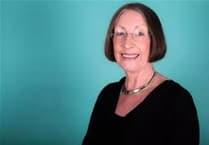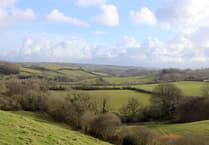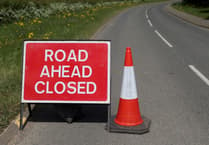Local democracy reporter Richard Whitehouse interviews the new Bishop of St Germans on learning about Cornwall, his focus on young people and families, climate change, and the challenges of starting a new job in lockdown.
Lockdown is an odd time to start a new job, but even more so when that job usually involves getting out into the community and meeting new people.
The Bishop of St Germans Hugh Nelson came into his new role last summer, moving to Cornwall from Kent where he had been a parish priest.
And while he has tried to get to know Cornwall over the last few months it has not been easy due to the Coronavirus pandemic.
“I have only been a Bishop in lockdown, I have only been in Cornwall in lockdown,” he explains.
“We moved in July so it has been pretty odd. If lockdown is going to lift and we are on the way out now, I personally, in my role, will have to begin all over again.”
Bishop Hugh was not entirely familiar with Cornwall before he came here, he had previously been here on holiday, but he admits he had no particular connection to the Duchy.
With a particular interest in helping young people and families as well as the environment and climate change he was aware that these are issues in Cornwall.
But he says that while he knew that there were issues with poverty and deprivation in Cornwall it was only now that he had seen it from within that he could really appreciate the challenges that Cornwall faces.
Over the last few months he said that he had engaged in lots of conversations with different people and organisations to learn about Cornwall and those issues.
And, prior to the latest lockdown, he was able to visit some schools and meet some children and learn about their experiences both generally, but particularly during the pandemic and lockdown.
He said: “My impression was that it wasn’t just a case that there wasn’t enough money and food around but that for children the opportunity to have fun and be a child had been extremely difficult in the first stages of lockdown.”
Asked what the church could do to help with this Bishop Hugh said that there had been a number of different things in recent months.
“Many churches have been on the frontline of straightforward practical support,” he said.
He highlighted a church in Bodmin which had been running a mini foodbank prior to Covid-19 where people had donated food which would be placed on a table outside for those in need to help themselves.
“Since then it has developed and they now deliver hundreds of bags of food and supplies for babies as well as fun packs for children.”
Another way the church has helped is in “amplifying the voice of children”, he explained: “We are involved in a lot of schools and have contact with a lot of children, but not just through formal statutory routes. We can hear what children are saying and amplify that.”
Bishop Hugh explained that ahead of the G7 summit, which is being held in Carbis Bay in June, the church wanted to focus on children and the environment.
He said: “Rather than me saying what I think we want we are gathering children together and asking them what they want. This is a real opportunity for them to speak to world leaders and we want them to have that.”
Bishop Hugh has always wanted to help children and young people and work with groups and organisations to help them thrive.
One of the key areas for him is the mental health of children and young people which has been at the forefront of children’s wellbeing in recent years.
“Part of the trouble for young people is they have been burdened with levels of anxiety about the future – that could be Covid or could be eco anxiety. Then you look at the social media world where they are under constant scrutiny.”
And he said that when looking at getting children back to school it was important to focus on their general wellbeing as much as their education.
“It seems pretty clear, particularly with young people and children, that we need to pay as much attention to restoring their emotional wellbeing and their wellbeing in the round as we do in being back on track educationally.”
However, Bishop Hugh said that despite the difficult times which the world is going through with the pandemic and climate emergency it was important to focus on hope.
“The future is not inevitable, there is hope. Hope is a key word in the church – faith, hope and love are key.
“There is something that we can say about hope – the church is in the business of community, it is about building communities that will look hopeful.
“Hope is not the same as optimism and is not ‘grit your teeth and you will get through this’. It is about showing that the suffering that people might be experiencing is not the end of the story, there is another chapter.”
The Bishop also said that the pandemic had given people a chance to reflect on their lives.
He said: “During the first lockdown I suggested to some people in Kent that they might write a letter to their future self about what they have experienced.
“It might be something to do now, what are we learning from the current lockdown and what are we learning that we must not lose?
“Many of the people who did that talked about quality of relationships with other people locally and how our lives changed when we were forced to slow down and notice the people around us more.
“The number of people said that they had got to know their neighbours really well and I hope that we hold on to those aspects after the pandemic.”
One other positive note from the pandemic and lockdown has been the speed with which companies, organisations and councils shifted so that they could continue operating and supporting people in need.
Many people were forced to work from home as their workplaces closed during lockdown and businesses also had to find new ways of serving customers in a lockdown.
And for the church as well the lockdown has forced its hand to find new ways of reaching congregations and parishioners.
Bishop Hugh said: “The church is not famous for changing rapidly or being agile. If you had said a year ago that within a couple of weeks the vast majority of churches would get online I wouldn’t have believed you, but they did.
“When you have got to do something it is sometimes surprising how quickly we find that we are able to make those changes.”
Bishop Hugh has a keen interest in the environment and climate change which he says is in part due to his wife Lizzie working for groups engaged with climate change and the climate emergency.
And he said that his interest in the environment is also driven by his faith and the fact that the world was given for humans to “manage and we need to cherish it and care for it”.
He said that the way that the world has adapted due to the pandemic should be used as a template for how we need to change the way we live our lives to tackle the climate emergency.
The Bishop highlighted how fast many aspects of society moved to make changes and how people found they were able to give up things they previously did as a result of lockdown.
“What if we did that with the climate emergency and about preventing it? That is the opportunity before us to learn from this.
“If someone said two years ago that this thing called a Coronavirus would emerge and you have a year to prepare for it, imagine what we would have done.
“We know that climate change is happening, why are we not paying attention to that? Covid, in a sense, is a warning and we have an opportunity which will never come again.
“We can look at how we have adapted to the pandemic and use that to learn how to adapt to climate change both as individuals and collectively. We need to speak to companies and government and say that is what we want.”
He added: “During the pandemic many of us have learned that we can do without things that we thought were essential. We need to learn from that and not rush out and buy lots of stuff
And in looking after the planet Bishop Hugh said that we will be helping future generations.
“It is their future world. It is easy for us to say I won’t be here to see the worst effects. We need to make sure it is safe for the future.”
Bishop Hugh said that the Church of England had made a commitment to helping tackle climate change and said that it was aiming to be carbon neutral by 2030.
But he said that the church would also speak up more about climate change and encourage everyone to play their part.
Bishop Hugh is now looking forward to being able to get out and about in Cornwall and meet more people, when restrictions allow.
However he is aware that it could take some time for people to adapt to life after the pandemic.
“I heard the Archbishop of Canterbury saying informally that he wonders whether once we come out of the end of this there will be a corporate sense of PTSD.
“As a whole society we have through something traumatic, we have been told for a year that we might be a threat to one another and felt unsafe and anxious.”
He added: “We are created to be social and be community minded with each other. There are people who have said they have had a good lockdown – particularly in the first lockdown – because they have been able to take more time over things, they spent more time with their families and appreciated relationships more.”




